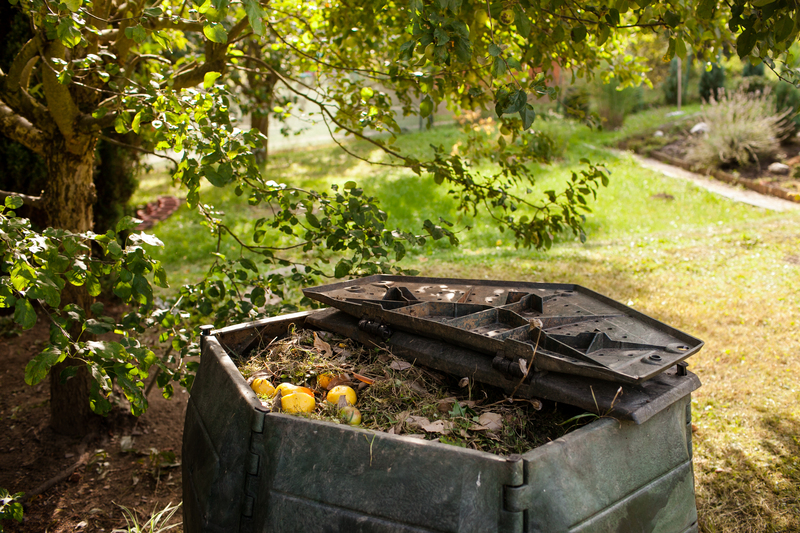Economical Solutions for Getting Rid of Bulky Waste
Managing bulky waste is a challenge for homeowners, businesses, and municipalities alike. From old furniture and mattresses to large appliances and renovation debris, removing oversized items without breaking the bank requires smart planning and resourcefulness. This comprehensive guide explores a wide range of economical solutions for getting rid of bulky waste. Read on to discover environmentally-friendly, convenient, and cost-effective ways to clear your space, comply with local regulations, and contribute to a cleaner community.

Understanding Bulky Waste: What Qualifies and Why Is It an Issue?
Bulky waste refers to large items that ordinary waste collections will not accept due to their size or weight. Examples often include couches, chairs, beds, wardrobes, large toys, carpets, white goods (fridges, washing machines), and sometimes garden waste like branches or fencing.
*These items not only occupy significant space in landfills but may also contain components hazardous to the environment if not handled properly. Improper disposal can attract fines, harm local habitats, or pose risks to sanitation workers.*
Common Types of Bulky Waste
- Old furniture (sofas, armchairs, tables, shelving units)
- Large appliances (refrigerators, ovens, washing machines)
- Mattresses and bed frames
- Home renovation debris (carpet, drywall panels, bathtubs)
- Yard waste (tree stumps, excess logs, fencing)
- Electronic waste (televisions, computers, copiers)
Why Seek Economical Bulky Waste Disposal Methods?
Most people discover that disposing of bulky waste can become expensive, especially if using private collection or skip hire services. However, affordable approaches save you money, reduce landfill impact, and often support local communities. The aim is to find methods that are wallet-friendly, eco-conscious, and straightforward.
Affordable and Eco-Friendly Options for Bulky Waste Removal
1. Recycling Centers and Civic Amenity Sites
Many councils and municipalities operate recycling centers (sometimes called household waste recycling centers or HWRCs) that accept specific bulky waste items--often at no charge or a minimal cost. Before heading out, check your local center's rules, as some require proof of residence, appointments, or payment for certain items.
- Advantages: Usually free or low-cost, supports recycling.
- Disadvantages: You must provide transport, certain limits may apply.
2. Council Bulky Waste Collection Services
Most municipalities offer scheduled or on-demand bulky waste collection services. Prices are generally less than those of commercial haulers, with lower-income households often qualifying for discounts or free collection. Be sure to check:
- What items your council accepts and how to prepare them
- Fee structures (flat fee per item or per collection)
- Booking procedures (some require advance notice or online forms)
3. Charity Shops and Non-Profit Collection
*Give your bulky items a second life!* Donating reusable goods to charity shops is an excellent way to minimize landfill waste, support social causes, and clear space at no cost. Many charities collect furniture and appliances from your doorstep if items are in reasonable condition and meet safety regulations (e.g., fire labels on sofas).
- Contact local charities to ask what items they accept and if collection is available
- Prepare items by cleaning and checking for missing parts
Examples of charities you can contact:
- Habitat for Humanity ReStores
- The Salvation Army
- British Heart Foundation Furniture & Electrical Stores (UK)
*Charity collection is both eco-friendly and cost-free, creating community benefits while eliminating your clutter.*
4. Re-Use Networks and Online Marketplaces
Technology can make bulky waste disappear from your doorstep--often for free or a small fee. Local re-use networks and online classifieds (such as Freecycle, Craigslist, Facebook Marketplace, or Gumtree) connect those giving away items with nearby people seeking them.
- Post a clear photo and description of your item, specifying that it's free or cheap for collection
- Be honest about the item's condition to avoid no-shows
- Arrange for the new owner to collect--saving on transportation and disposal fees
_Fast, convenient, and a great way to help others furnish their homes on a budget._
5. Upcycling and Repurposing Projects
Before sending that dusty bookshelf to the curb, consider whether it can be upcycled. Creative repurposing saves money, reduces waste, and can yield unique results. Transform old doors into tables, mattresses into pet beds, or pallets into garden furniture by browsing DIY blogs and tutorials.
- Get inspired by social media and upcycling forums
- Organize community 'swap or craft days'
- Re-sell upcycled products or donate them
Cutting Costs Through Community Collaboration
6. Bulk Collection Days and Neighborhood Cleanups
Many areas organize annual or seasonal bulk waste pickup events where residents can leave large items at the curb for collection. These are often subsidized or entirely free, reducing individual cost. Alternatively, volunteering in community cleanups may grant you access to waste removal services for items you collect.
*Contact your local municipality or homeowner's association for details on the next scheduled event.*
7. Shared Skip Hire and "Skip Bag" Solutions
Hiring a skip (dumpster) can be expensive, especially for smaller loads. Pooling resources with neighbors to fill a shared skip brings costs down significantly. Alternatively, skip bags (flexible sacks for collection) are a space-saving and cheaper alternative for disposing of smaller quantities of bulky waste.
- Coordinate booking and payment with neighbors or friends
- Sort contents ahead of time--banned or hazardous items may incur extra costs
- Choose the right size for the job to avoid overpaying
*Shared solutions maximize savings and reduce logistical hassles.*
8. Local Haulers and Handyman Services
For those without vehicle access, hiring a local van service or small-scale hauler may be more affordable than larger removal companies. Handyman services sometimes offer package deals for bulky item removal as part of home improvements.
- Ask for group rates if multiple neighbors need collections
- Request an exact quote and check for all included costs (loading, disposal fees)
Reducing Bulky Waste at the Source
9. Smart Purchasing and Minimalism
The best way to minimize disposal costs is to avoid generating unnecessary bulky waste in the first place. Think carefully before buying new large furniture or appliances. Opt for durable, modular items that can easily be dismantled, repaired, or moved. Minimalism and decluttering principles not only save future costs but also promote stress-free living.
- Donate or sell old items before replacing them
- Consider renting or borrowing items for short-term needs (party chairs, guest beds)
10. Extended Producer Responsibility
Increasing numbers of retailers and manufacturers offer take-back schemes for old products when you purchase new ones, especially for mattresses and appliances. Reputable brands may dismantle and recycle your old item responsibly, often at low or zero cost.
- Inquire about recycling or trade-in programs when making new purchases
- Retain receipts and proof of take-back commitments for reference
How to Choose the Right Bulky Waste Disposal Option for You
Choosing the most cost-effective way to dispose of your bulky items depends on several factors:
- Quantity and type of items: Large volumes may require different solutions than a single sofa or appliance
- Condition: Reusable items are best donated or re-sold, while damaged goods need recycling or disposal
- Accessibility: Consider if you have transportation, physical capability, or time
- Local regulations: Some options depend on city ordinances or collection schedules
- Budget: Assess cost-free versus low-cost versus premium services
Always start by checking with your local council, as they can offer guidance, service lists, and advice specific to your area.
Environmental and Legal Considerations
Disposing of bulky waste responsibly protects both your wallet and the environment. Fly-tipping (illegally dumping rubbish) is not only harmful but can result in steep fines and even criminal charges. When hiring private companies, ensure they are licensed and provide you with the correct waste transfer documentation.
- Never burn items like mattresses, plastics, or electronics--these release toxic fumes
- Recycle and reuse wherever possible
- Protect sensitive information: wipe or destroy hard drives before recycling electronics

Frequently Asked Questions about Economical Bulky Waste Solutions
Q1: What is the cheapest way to get rid of furniture or appliances?
Donating items to charity, using online marketplaces, or accessing free council collection services when available are the lowest-cost options. If these aren't possible, check for low-cost recycling centers nearby.
Q2: Who picks up large garbage for free?
Many cities and regions offer free or subsidized bulky waste collections for residents on certain days or for those meeting income or disability criteria. Charitable organizations may also provide free collection for reusable goods.
Q3: How do I dispose of a mattress or fridge economically?
Retailers may offer removal and recycling when you purchase a replacement, sometimes at little or no cost. Municipal recycling centers and some charities also accept mattresses and white goods, provided they meet certain conditions.
Q4: Can I break up bulky waste myself to save money?
Many items can be dismantled for easier transport or to fit in your normal bin, reducing costs. Always use appropriate tools and handle sharp or heavy components with care. Never attempt to break up hazardous items like fridges, as they may require specialist disposal.
Conclusion: Clearing Big Items Doesn't Have to Cost Big Money
Economical solutions for getting rid of bulky waste are readily available for those willing to research and plan a little. From leveraging council collections and recycling centers to donating and upcycling, these approaches allow you to clear your space affordably while helping others and protecting the environment. Always choose responsible, legal methods and take advantage of local resources to save money and reduce your environmental impact.
Ready to begin? Start with your council website, local charities, and online communities--and transform your clutter into an opportunity for savings, sustainability, and positive change!
